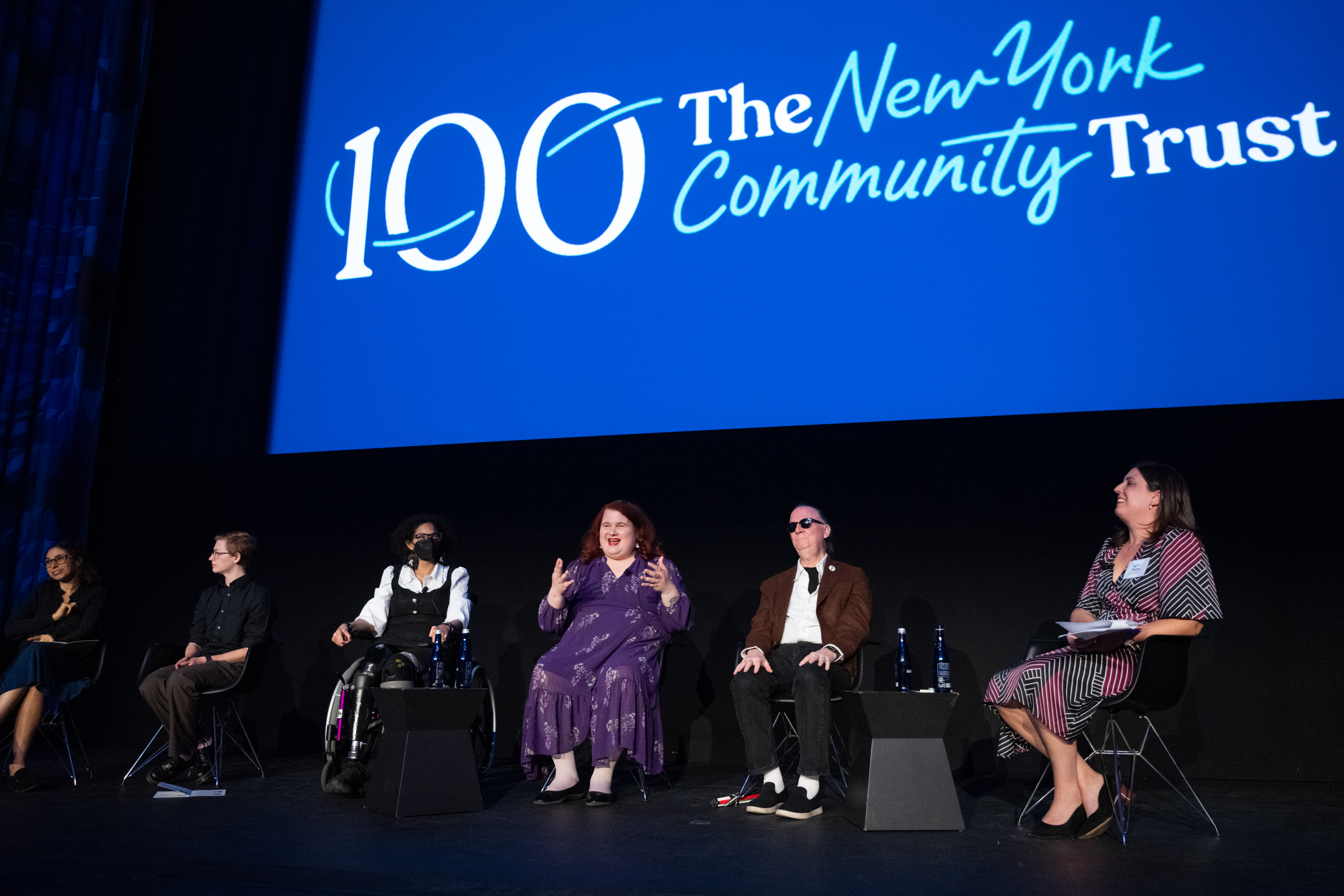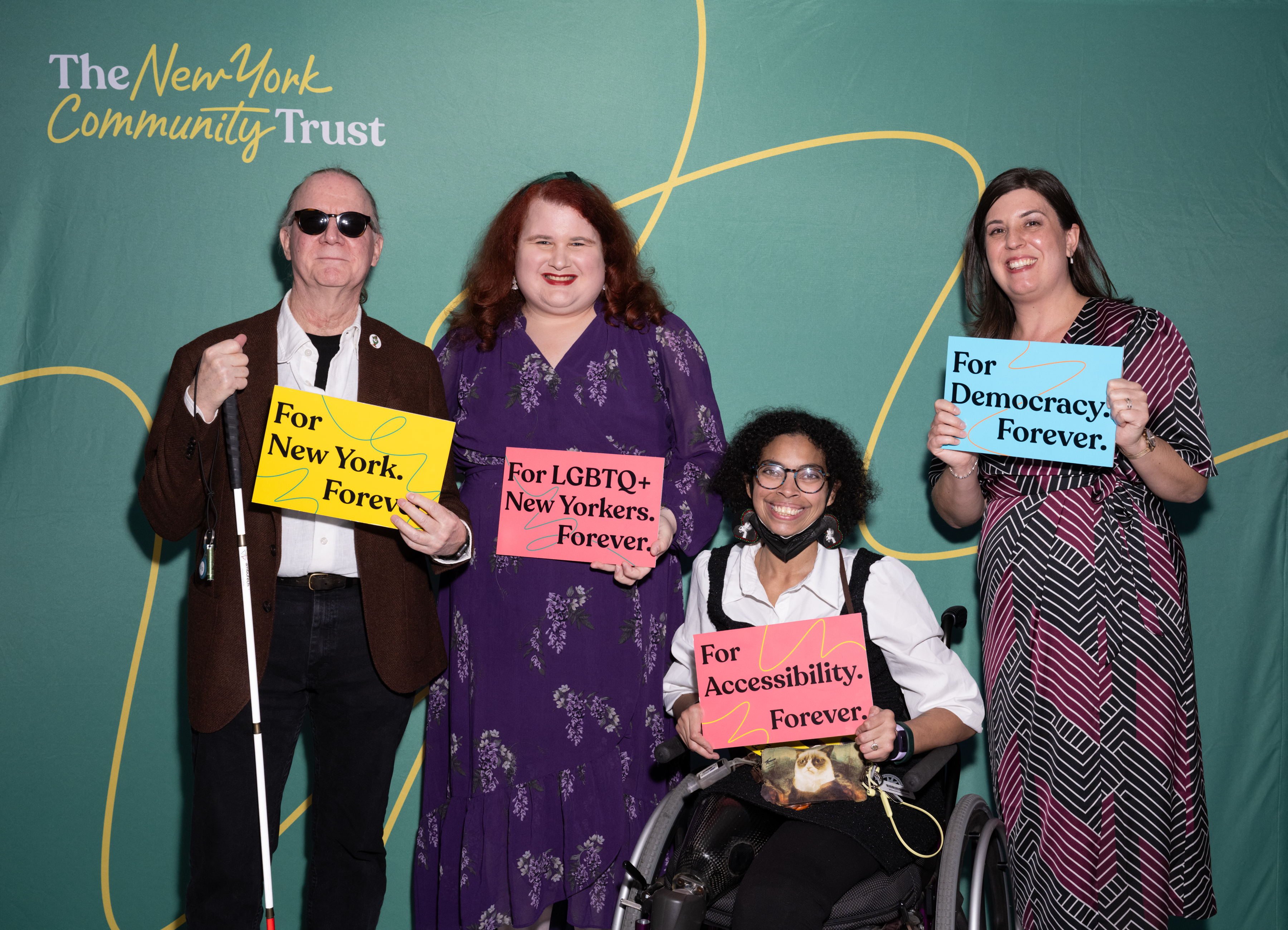
Eman Rimawi-Doster, Darcy Connors, Wayde Harrison and Rachel Pardoe (from 3rd left to right) participated in a panel discussion at MOMI. Photo courtesy of NYCT
Oct. 28, 2024 By Iryna Shkurhan
To celebrate the 100th anniversary of the NY Community Trust, advocates pushing for a more accessible world for the disabled discussed their mission at a public event in Astoria.
The event at the Museum of the Moving Image on Oct. 23 centered around a panel discussion titled “For Accessibility. Forever. Getting There: Building a More Inclusive Region.” It was one of several events in the region marking the centennial, each focusing on a cause.
The Trust’s discussion on Long Island focused on farms and food security. The Bronx focused on breaking cycles of incarceration, and Staten Island focused on coastal communities adapting to the effects of climate change. And in Brooklyn, the focus fell on neighborhood arts, culture & preservation. The range of events emphasized the broad scope of the trust’s philanthropy over the past century.
“From cats to cancer, from climate to culture,” NYCT President Amy Freitag quipped during Wednesday’s panel. “The trust has been really working to make the city and region a healthier and more equitable and vibrant place, and all this is made possible by generations of generous donors.”
In Queens, the focus was on envisioning how to make community spaces, including housing, workplaces and transportation, more accessible. It was acknowledged that cultural institutions such as the New York Hall of Science, Queens Theatre, and Queens Museum have already set an example of accessibility and inclusivity.
“They’re all kind of the leaders in thinking about how to be accessible, how to make sure that their programs are welcoming everyone, no matter their ability, no matter their language barrier, and really leading the charge and having conversations about how other more well-known organizations that are a little bit slower to do that,” said Rachel Pardoe, Senior Program Officer at the Trust, while moderating the panel discussion.
The panelists themselves shared their unique perspectives on navigating the world with a disability, whether they were born with it or became disabled later in life. This has influenced their advocacy work for a more accessible and inclusive world, allowing people with disabilities to participate fully in society.
“I think the issue is that people don’t recognize that ADA [Americans with Disabilities Act of 1990] is the floor, not the ceiling,” shared panelist Eman Rimawi-Doster, a Senior Community Organizer with the Disability Justice Program and New York Lawyers for the Public Interest.

The panelists stressed that a more accessible world for the disabled benefits society at large. Photo courtesy of NYCT
Rimawi-Doster is also the Executive Director of Diversity Includes Disability, which is run for and by disabled people. There, she trains other organizations on diversity inclusion, and she shared that on many occasions, higher-ups did not believe that they employed disabled individuals. It wasn’t untiled she shared her own struggles with lupus, a brittle bone disease that left her as a double amputee in a wheelchair, that others felt comfortable and safe to open up.
“With all these kinds of disabilities, people can do all kinds of work, not just menial, low-paying jobs. We have the ability to do whatever we are passionate about. Our skills, our knowledge, and our drive is all worth it,” Rimawi-Doster shared. “I’m proof of that. Thinking that we simply can’t do something because of our disability is completely illogical.”
Another panelist, Wayde Harrison, was diagnosed with a progressive eye disease that deteriorated his vision over the last two decades. He shared his own experiences, from more mundane difficulties of watching television to securing employment that matched his experience and skill set.
“Oftentimes, when those jobs are being filled, people with blind or low vision in those organizations are not being considered. And I think that that’s a real mistake. And I think that needs to change,” said Harrison, who donates to the Trust.
He was an example of what all the panelists stressed — that anyone can become disabled at any point, especially as they age, which is why they believe ageism and ableism go hand in hand.
“There’s an intersection with ageism and ableism. If you live long enough…the likelihood of having more and more disabilities is likely,” said panelist Darcy Connors, Executive Director of SAGEServes, which provides resources for LGBTQ+ elders. “It’s really important to think about the intersection of the two and how we can support each other.”
Connors also noted that housing is also a major consideration, as she has seen in her work with older adults. “Housing is the basis for a lot of things for older adults and those living with disabilities.”
The panelists also mentioned the well-known curb cut effect, a metaphor that describes how using disability-friendly features in the design of spaces will benefit a much larger group. Sidewalk ramps, also known as curb cuts, are helpful not only for people in wheelchairs but also for parents pushing strollers and truck drivers making deliveries.
“If it’s helpful for disabled people, it makes it better for everyone,” added Harrison.
Attendees were also asked to share their vision and vote for New York’s next 100 years and submit ideas for how the trust can allocate $3 million in funds in 2025 through a digital portal.
“Despite the trust being one of the biggest funders of disability in New York City, it’s a drop in the bucket compared to what the need is,” acknowledged Pardoe during the panel.
